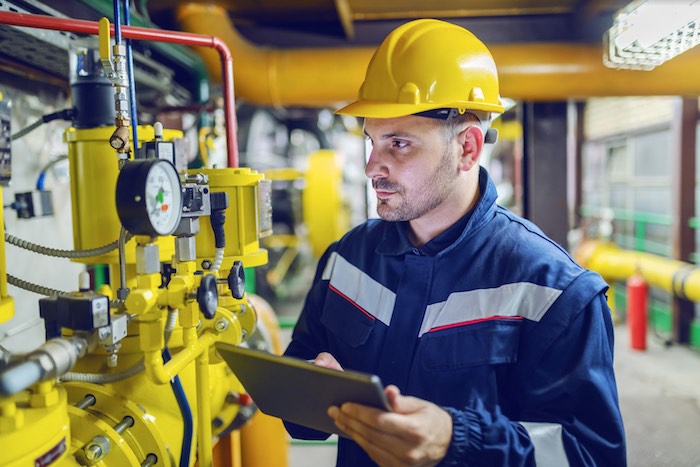Also Interesting
5 Careers In The Energy Industry

The energy industry is considered the lifeblood of every other industry. After all the agricultural and commercial sectors can only run smoothly with reliable and affordable energy. In this regard, the energy industry requires talented and committed people to drive the production of energy.
If you’re interested in working in the energy industry and are wondering about the career path to take, this article will guide you through five major options. Jump right in!
- Pipeline Contractor
Pipelines are the “veins” of the energy industry. They’re used to transport oil and gas safely and efficiently in multiple stages of the fuel production process. Pipes are more efficient than transporting oil via roads or rail since they’re highly flammable fluids. Even transferring the pipes needed to connect the source to a plant is cheaper compared to hauling the oil itself in specialized tanks.
As a pipeline contractor, there are many jobs you can get given the ever-expanding networks. For example, Macro Enterprises Inc. recently signed a multi-million pipeline construction contract. Now, a 160 million contract means new jobs for mechanics, welders, heavy equipment operators, pipefitters, and other professionals. That implies opportunities are always there if you’re diligent enough in watching out for them.
- Petroleum Geologist
As a geologist, your primary role is to estimate the presence and amount of combustible fuel in both land and sea. You need to have a basic understanding of the fuel’s origin, concentration, and movement patterns. You should also be able to determine the presence of different factors that can hinder this movement. As a petroleum geologist, some of your tasks include the following:
- Generate post-project statements
- Execute drilling tactics for the extraction of the fuel
- Present and explain geophysical data in project reports
- Carry out field studies to evaluate project information
Some of the techniques you’ll use include satellite mapping and geochemical analysis. You may be employed by mining, oil, and gas companies, science centers, engineering firms, or environmental consulting companies.
To qualify as a geologist, you need to obtain a Bachelor’s degree in Geology or Environmental Science. Having a Master’s degree will be an added advantage. You should also learn about global positioning and geographic information systems as you’ll rely on them heavily in collecting data. And since you’ll be working with a team, you must also have excellent interpersonal skills.
- Accountant
Every industry requires someone to run their finances and accurately keep records. As an accountant in the energy industry, your main task is keeping track of payments to vendors, subcontractors, and other employees. Your core roles include:
- Monitoring expenses and budgets
- Auditing and evaluating financial achievements
- Recommending methods that decrease costs and enhance profits
- Compiling and submitting a budget and financial reports
You need to have a certificate, associate, or Bachelor’s degree in accounting to be employed. Also, you need core skills like data entry, spreadsheet analysis, preparing financial reports, and evaluating numbers and figures.

- Energy Engineer
Energy Engineers are mostly in charge of creating the processes and facilities needed to improve the engineer industry. The various specialties like chemical, industrial, mechanical, electrical, and petroleum engineering are needed in different fields such as renewable energy or gas and oil production. As an engineer, your role is to:
- Plan and establish ways of extracting underground oil and gas.
- Research, plan, assess, and handle engineering equipment. This ensures the equipment meets the requisite conditions to be put into use for energy production.
- Evaluate manufacturing costs and the impact of altering the product designs on expenses for management reviews.
- Establish methods of enhancing existing methods of production.
- Design and test new machines.
- Convert, transmit, and supply sufficient energy to meet people’s demands.
To become an engineer, you need to obtain a bachelor’s degree in the field of your specialization. You also need to get a license to improve your chances of being employed. In addition to your educational qualifications, you must be a good decision-maker, problem-solver, and have good communication and leadership skills.
- Professional Health and Safety Specialist
Most energy industries such as wind energy, oil and gas extraction, coal mining, and power plans involve processes that pose a few key safety hazards. Thus, health and safety specialists are needed to analyze and maintain safe working environments for employees. Other duties of such professionals include:
- Establishing methods and procedures to manage, eradicate, and prevent diseases.
- Performing facility inspections and ensuring compliance to laws and regulations regarding the health and safety of employees.
- Inspecting workplaces to determine causes of particular accidents and developing ways of preventing them in the future.
- Educating employees on safety procedures when handling various equipment.
- Stopping projects that pause risks to the health and safety of employees
To become a professional in this field, you need to have a bachelor’s or master’s degree in occupational health and safety. Also, you’re required to have high personal skills, including being able to work with minimum supervision.
Conclusion
The energy industry has numerous well-paying career options. This is why it’s critical to settle on one field early enough during your studies, and pursue it diligently. Understanding the typical responsibilities of various jobs in this industry enables you to choose a career path that fits your personality. Ultimately, you’ll enjoy your work daily, earn enough money, and build yourself professionally.
Also Interesting
If You Frequently Travel, A Second Phone Number Can Be A Cost Effective Solution

Advances in transport technology have reduced not only travel times but also costs. Airlines and tour companies offer a wide array of cut-price deals, so if you already have a destination in mind, sign up for email alerts. Today, you can fly from Canada to Europe in around 6 hours, whereas decades ago, the same journey took weeks by boat. Maybe you travel to represent your organization for work-related purposes. In that case, you get to combine business and leisure, so you’ll return to the office refreshed and ready to be productive.
Suppose you’re an international traveler, a savvy vacationer, or even a local adventurer. In that case, you know a few trips make your trip easier: a passport, comfy shoes, and a six-port USB charger. And it doesn’t take long to realize there’s one thing you’ve forgotten. You need an eSIM Canada for enhanced privacy protection, streamlined communications, and the ability to avoid expensive roaming charges. You probably have an expensive Android or iPhone device, so the last thing you want is another handset. There are many ways to add an extra phone number that works with your smartphone.
Get And Setup An eSIM, Which Works Like A Physical SIM Card
eSIM technology offers a seamless, more integrated approach to connectivity, so it’s a progress from traditional SIM cards. By enabling the eSIM profile, you get access to the operator’s network, which is optimized for local access and helps avoid potential roaming restrictions. This level of resiliency is convenient for specific use cases, such as Google Maps, that require automatic initial connectivity. I you’re traveling, it’s recommended to install the eSIM a couple of hours before your trip or once you’ve reached your destination. The validity period starts counting. You’ll need a WiFi or data connection to set up the eSIM on your device.
You can manually activate the eSIM by pasting the installation code (and any other required information) if you don’t have another device to scan. You should activate the eSIM as soon as you arrive at our destination to prevent your mobile phone data from being used. Activating roaming or data roaming from your device will activate the plan. You can install the eSIM by scanning the QR code you received from the provider: open the built-in camera app, point the camera at the QR code, and tap the banner that appears on your phone. Label the eSIM and set your preferences for calls, messages, and data.
Not Only Do You Get To Keep Your Phone, But You Can Also Add A New Number
An additional phone number allows you to distinguish between personal and professional calls and messages, fostering a healthier work-life balance, and adds another layer of anonymity when interacting with strangers. Work, friends, family, and dating contacts are entirely separate. Texting is unlimited, calling works with your carrier within minutes, and voicemail is easy to customize. You can talk and text using any phone number at any time. The second line might be a disposable or semipermanent number. When traveling overseas, you’ll need to provide your phone number to hotels, bicycle-sharing services, and so on.
Having a phone that works just like it does back home when traveling abroad is the best thing you can do to reduce stress. Being able to keep in touch with family and friends, using Google Translate, and having access to booking sites in the event of delays are just some of the reasons why Internet access is indispensable. Get a full-featured number that supports limitless Internet so you can use apps like WhatsApp, Facebook Messenger, or Skype. It’s not a good idea to use image-heavy social media apps like Snapchat or Instagram.
How To Get The Best Performance Out Of Your Esim When Traveling
Some smartphones have both a removable SIM card and an eSIM card, which allow users to have two separate numbers – i.e., a personal number and a work number – on one device. After establishing a connection to a mobile network, your eSIM will be functional and ready for immediate use. Using a local mobile network while overseas is more affordable than paying roaming costs to your home network; should you mistakenly erase your eSIM, you must reach out to your provider and ask for another installation code. Some device manufacturers offer instructions on how to use plans from two different providers.
In what follows, we’ll present our favorite tips on how to make the most of your eSIM when traveling abroad:
● Strategically plan your data usage: Review your plan details before jetting off. Understanding what your eSIM package includes will help you prepare for your trip and stay connected while miles away.
● Give your eSIM a custom name: During the eSIM installation, you can label your new SIM. For instance, you can name the eSIM “Travel” or “Canada eSIM” and your existing physical SIM “Personal”. If you change your mind, you can edit them at any time.
● Turn on push notifications: You can turn on push notifications to be informed if data is running low or your eSIM is about to expire. You can stay focused without constant interruptions.
In Closing
If you’re traveling internationally, having a second phone number can offer several advantages, such as security, privacy, and convenience. It can be used for bookings, online registrations, and transactions, therefore minimizing the risk of your primary number being exposed to scams and other types of cyberattacks. You can install one or more eSIMs on your device and have two phone numbers at the same time. Remember, the service provider has control over the subscription and is required to maintain an adequate phone signal.
The eSIM plan will automatically expire once you’ve used up your data or when your purchased days run out. You can add more days to your existing plan by reloading your eSIM: simply log into your account and choose the eSIM you wish to extend so you don’t have to worry about connectivity interruptions. This is ideal for short or even long-term travelers.
Also Interesting
How to Deposit and Withdraw in CAD at Sol Casino: A Guide for Canadian Players

When choosing an online casino, Canadian players not only look for exciting games and bonuses but also for easy and secure payment methods in Canadian dollars (CAD). Sol Casino understands this need and has created a streamlined system for deposits and withdrawals that suits players across Canada.
This guide walks you through how to fund your account, cash out your winnings, and which methods are most efficient and convenient.
Why Use CAD at Sol Casino?
Sol Casino supports transactions directly in Canadian dollars, which is a huge advantage. This means:
No currency conversion fees
Simplified banking
Faster transactions
Better tracking of your gambling budget
For Canadian players, avoiding unnecessary fees and delays is crucial. Sol Casino ensures you can deposit and withdraw in your local currency without any added complications.
How to Deposit Funds at Sol Casino (Step by Step)
Funding your Sol Casino account is simple. Follow these steps to make a deposit:
1. Log in to your Sol Casino account.
2. Go to the Cashier/Deposit section.
3. Choose your preferred payment method.
4. Enter the amount you wish to deposit (minimum deposit usually starts at $20 CAD).
5. Follow the prompts to complete the transaction.
Most deposits are instant, meaning you can start playing right away.
Popular Deposit Methods for Canadians
Sol Casino offers a variety of trusted options tailored for Canadian players:
Interac e-Transfer: A go-to choice in Canada, easy to use and highly secure.
MuchBetter: A modern e-wallet app offering fast, private transfers.
ecoPayz: Another reliable e-wallet widely used in Canada.
Visa/Mastercard: Traditional and familiar for most users.
Cryptocurrencies: Includes Bitcoin, Ethereum, and more for added privacy.
Each method is secure and designed to fit your lifestyle and preferences.
How to Withdraw Winnings in CAD
Cashing out your winnings is just as easy. Here’s how to request a withdrawal:
1. Go to your account dashboard and select Withdraw.
2. Choose the same method used for depositing (if possible).
3. Enter the amount you want to withdraw.
4. Submit your request and wait for confirmation.
Before processing your first withdrawal, Sol Casino may ask for ID verification to comply with KYC (Know Your Customer) rules. This is standard for any legitimate casino and helps protect your account from fraud.
Withdrawal Processing Time
Sol Casino processes withdrawal requests quickly. Here’s a general idea of how long it may take:
E-wallets (MuchBetter, ecoPayz): 0–24 hours
Cryptocurrency: 1–12 hours (depending on network speed)
Interac: 1–2 business days
Cards (Visa/Mastercard): Up to 3–5 business days
Once your identity is verified, future withdrawals are often processed faster.
Tips for Smooth Transactions
Verify your account early to avoid delays during your first withdrawal.
Use the same method for deposit and withdrawal whenever possible.
Set responsible limits to manage your gambling activity.
Watch for promotions offering cashback or deposit bonuses for specific payment methods.
Sol Casino also sends notifications and email confirmations for each transaction, adding transparency to the process.
Customer Support for Payment Issues
If you run into any trouble while depositing or withdrawing, Sol Casino has a 24/7 support team ready to help. You can use:
Live chat for immediate assistance
Email support for more detailed inquiries
FAQ section with answers to common questions about payments
All services are available in English and French, making support accessible to all Canadian users.
Conclusion: Fast, Flexible, and Canadian-Friendly Banking
Sol Casino has built a payment system that respects Canadian needs. With support for CAD, a variety of local methods like Interac and MuchBetter, and fast withdrawals, it provides a hassle-free banking experience. Whether you’re playing for fun or aiming for big wins, Sol Casino ensures your money is handled safely, securely, and efficiently.
-

 2025 Federal Election2 days ago
2025 Federal Election2 days agoThe Federal Brief That Should Sink Carney
-

 Media1 day ago
Media1 day agoCBC retracts false claims about residential schools after accusing Rebel News of ‘misinformation’
-

 Bjorn Lomborg1 day ago
Bjorn Lomborg1 day agoNet zero’s cost-benefit ratio is CRAZY high
-

 2025 Federal Election1 day ago
2025 Federal Election1 day agoMark Carney Wants You to Forget He Clearly Opposes the Development and Export of Canada’s Natural Resources
-

 2025 Federal Election1 day ago
2025 Federal Election1 day agoPolice Associations Endorse Conservatives. Poilievre Will Shut Down Tent Cities
-

 2025 Federal Election1 day ago
2025 Federal Election1 day agoCarney’s Hidden Climate Finance Agenda
-

 Alberta2 days ago
Alberta2 days agoLow oil prices could have big consequences for Alberta’s finances
-

 2025 Federal Election1 day ago
2025 Federal Election1 day agoPolls say Canadians will give Trump what he wants, a Carney victory.



